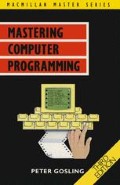Abstract
The great advantage of using C as a programming language is that it is a portable language. This means that a program written in C can be run on a variety of computers, not just PCs, and will run without any modification. This is not the case with the other languages described in this book. It is a structured language capable of being written in modules and it is, as with COBOL, Pascal and PROLOG, a language which can produce a compiled file, with a .EXE extension, so that it can be run directly from the operating system. C is used often used for what is called systems programming and such things as compilers for other languages and software packages are written in the language. The particular version of C used to produce the examples in this chapter is Turbo C®. The screen presented to you when using this version of the C language is the same as that displayed when you are using Turbo Pascal.
Preview
Unable to display preview. Download preview PDF.
Copyright information
© 1990 Peter Gosling
About this chapter
Cite this chapter
Gosling, P.E. (1990). C. In: Mastering Computer Programming. Macmillan Master Series. Palgrave, London. https://doi.org/10.1007/978-1-349-11094-0_13
Download citation
DOI: https://doi.org/10.1007/978-1-349-11094-0_13
Publisher Name: Palgrave, London
Print ISBN: 978-0-333-51005-6
Online ISBN: 978-1-349-11094-0
eBook Packages: EngineeringEngineering (R0)

